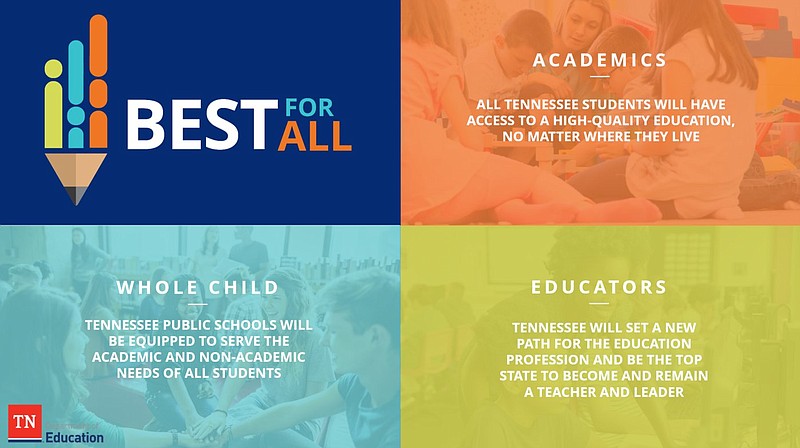Less than a year after Penny Schwinn took over as head of the Tennessee Department of Education, the commissioner launched a strategic plan that focuses not only on academics, but on supporting students even outside of the classroom.
The department's new strategic plan, "Best for All," focuses on three core areas: ensuring high-quality academic programs, supporting both students' academic and non-academic needs and developing quality educators.
Schwinn unveiled it to more than 1,000 educators Tuesday at the 2019 LEAD conference in Nashville.
"We want to ensure that every student is on a path to success. When they graduate, every student should know that they are able to accomplish whatever dreams they set for themselves," Schwinn said in a news release Tuesday. "The work we do for our children matters. They need us and deserve our best."
Some of Schwinn's priorities, which could change the direction the department takes with funding and when lobbying lawmakers, are already seen in Hamilton County Schools and might foreshadow changes to come across the state.
Supporting the 'whole child'
Schwinn has consistently touted the need for more supports for students, especially in regard to mental health, since she concluded her first statewide listening tour earlier this year. The need for mental health services and other services to address the non-academic needs of students - and their families - is the most common concern she's heard from educators, Schwinn previously said.
"State data shows that Tennessee ranks 38th in the country when it comes to youth and mental health," Schwinn told reporters Monday. "We must support the students we have in our classrooms today, and this means addressing both physical and mental needs."
Additional supports has been a hot topic in Hamilton County this year as government officials argued over how to fund public education and what the roles of schools are when it comes to addressing student needs.
Superintendent Bryan Johnson and the Hamilton County school board requested an additional $34 million to fund school counselors, social workers, behavioral interventionists and other support staff in its first proposed FY 2020 budget, but the additional funding was shot down by the county commission and only about half of the additional positions requested were funded for the 2019-20 school year.
The district has had programs aimed at providing support to students through partnerships and community school models for years, though. Northside Neighborhood House now partners with two schools, Red Bank High and Hixson Middle, and several community schools exist in the district's Opportunity Zone, such as at Orchard Knob Middle School, with programs that attempt to reach students' non-academic needs.
Schwinn did note that "not all of this work should be done by the school and the school shouldn't be substitutes for the parents," but nevertheless her strategic plan lays out a framework for creating regional committees and conducting another statewide listening tour to figure out how to meet some of the greatest needs in different areas of the state.
Tennessee Department of Education’s “Best For All” Strategic Plan Priorities:
1. Quality Academic Programs: All Tennessee students will have access to a high-quality education, no matter where they live.— Priorities include: early literacy supports, high-quality instructional materials, innovative assessments and career exploration.2. Whole Child Support: Tennessee public schools will be equipped to serve the academic and non-academic needs of all kids.— Priorities include: supports, character Education and exceptional education.3. Teachers and Leaders: Tennessee will set a new path for the education profession and be the top state to become and remain a teacher and leader.— Priorities include: recruitment, teacher preparation, career pathways and development.
What about improving failing schools?
Specific strategies or changes to how the state supports and funds the state's lowest-performing schools were not glaringly obvious in the commissioner's presentation or in information provided to reporters Monday.
But when asked by a reporter about the department's specific strategy for targeting those schools, Schwinn said the goals weren't separate for priority schools versus all Tennessee schools.
"We don't necessarily think of school turnaround as something separate and different from what should be happening in all our schools," she said Monday.
The department has been conducting a listening tour on school improvement with stops in Nashville, Memphis and Chattanooga to seek feedback from educators, families and community members on how to support failing schools.
On Oct. 28, the tour stopped at Brainerd High School, which is one of five schools that make up the Partnership Network. The network includes Brainerd High, Dalewood Middle, Orchard Knob Middle, Orchard Knob Elementary and Woodmore Elementary and is an initiative launched under former Commissioner Candice McQueen and Gov. Bill Haslam as an alternative to state takeover of Hamilton County's historically failing schools or adding them to the Achievement School District.
Felicia Everson-Tuggle, assistant commissioner of school improvement for the department, said it was working on more specific plans for the Achievement School District and priority schools, specifically by moving toward a tiered model of support for school improvement work with four steps that schools would work through.
"We need to take a step back and really think about what's working, what's not working and how we can better support schools, whether it's priority schools or schools in our Achievement School District," Everson-Tuggle said at the public meeting. "In order to do that, we need to hear from you."
Contact Meghan Mangrum at mmangrum@timesfreepress.com or 423-757-6592. Follow her on Twitter @memangrum.
